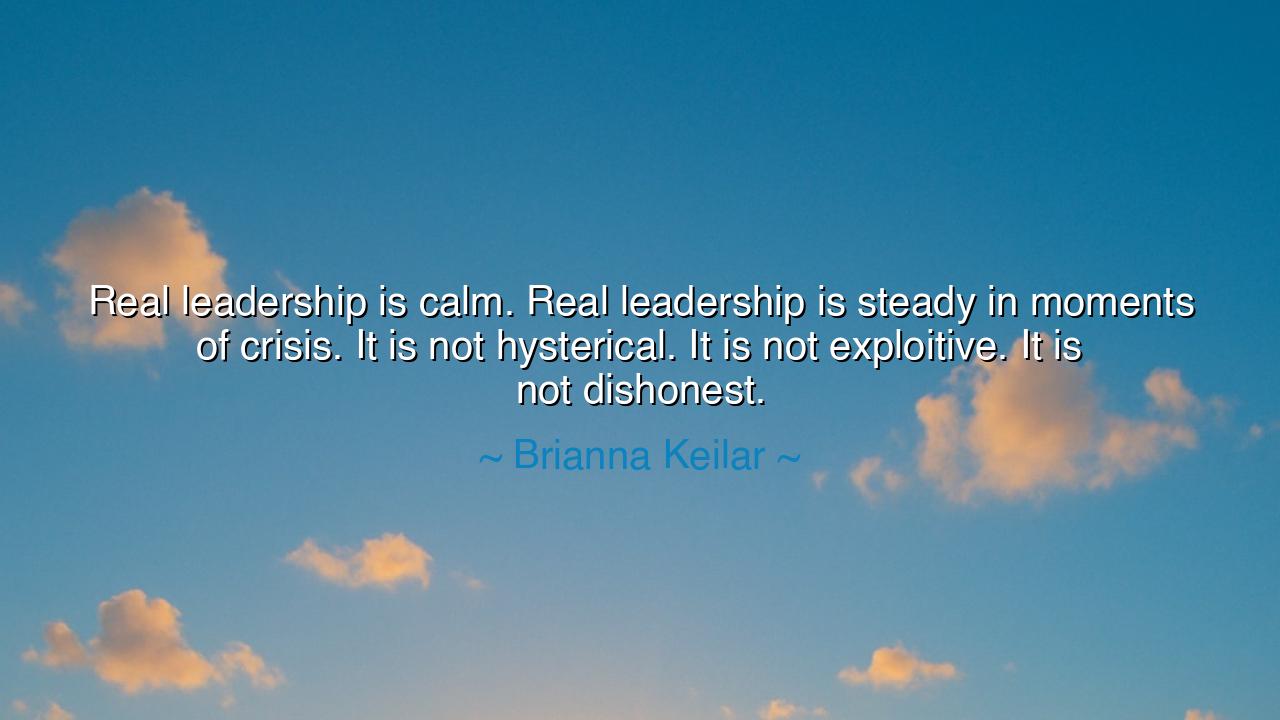
Real leadership is calm. Real leadership is steady in moments of
Real leadership is calm. Real leadership is steady in moments of crisis. It is not hysterical. It is not exploitive. It is not dishonest.






Brianna Keilar, speaking with the clarity of one who has seen the storms of politics and public life, declared: “Real leadership is calm. Real leadership is steady in moments of crisis. It is not hysterical. It is not exploitive. It is not dishonest.” These words shine like a torch in the darkness of turmoil, reminding us that the truest power is not found in shouting, scheming, or deception, but in the quiet strength of composure, integrity, and truth.
The meaning of this wisdom is simple but profound. In times of peace, many can appear as leaders. But in crisis, when the ground shakes and fear spreads like fire, only the one who remains calm can truly guide others. A hysterical voice multiplies panic. An exploitive hand deepens suffering. A dishonest word shatters trust when trust is most needed. But the leader who is steady—who stands like a rock while the waves crash—becomes the anchor for all.
The ancients understood this truth. In the history of Rome, when Hannibal threatened to march upon the city, the Senate was gripped by terror. Yet Quintus Fabius Maximus, the "Cunctator," counseled patience and calm. Though mocked for caution, he steadied the republic until victory was possible. His leadership was not dramatic, but it was steadfast. And it was this very steadiness, not rash hysteria, that preserved Rome.
Consider also the example of Winston Churchill during the Second World War. As bombs fell upon London, he did not exploit fear for power, nor did he lie to his people with empty promises. He spoke with truth—grim, but steady: “I have nothing to offer but blood, toil, tears, and sweat.” In his calm and his honesty, the people found courage. They endured not because he was the loudest, but because he was unwavering when the world seemed to collapse. Here, Keilar’s words come alive: true leadership is steady in crisis, refusing hysteria, refusing dishonesty.
Brianna Keilar’s words also condemn false leaders who exploit crisis for their own gain. History has seen many: tyrants who stirred panic to secure power, demagogues who lied to inflame hatred, rulers who, instead of guiding their people, preyed upon their fear. Such exploitive and dishonest leadership can raise armies and build empires—but always, they fall, for what is built on deceit cannot endure.
The lesson for us is timeless: measure leaders not by their noise, but by their calm; not by their promises, but by their truthfulness; not by their ambition, but by their steadiness in the face of storm. A true leader is like the captain of a ship: when the storm rages, he does not scream with the wind, nor abandon his crew, but holds the wheel firmly, guiding all toward safety.
And what must you do? In your home, in your work, in your community—be that steady hand. When others are shaken by fear, remain calm. When temptation arises to use others’ panic for your own gain, resist. Speak truth, even when it is difficult. Refuse dishonesty, refuse exploitation, refuse hysteria. In this way, even without armies or crowns, you practice real leadership—the kind that anchors souls in the midst of chaos.
Thus, remember Keilar’s wisdom: “Real leadership is calm … it is not hysterical, it is not exploitive, it is not dishonest.” Carry it as a law of life. For storms will come, and crises will test us all. But those who remain steady, who lead with calm and truth, will not only endure—they will guide others safely through the storm.






AAdministratorAdministrator
Welcome, honored guests. Please leave a comment, we will respond soon